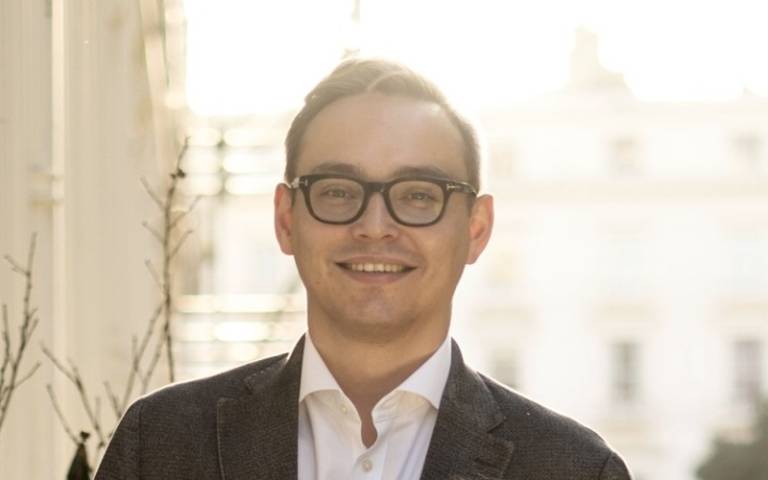Spotlight on... Yaroslav Melekh
30 November 2023
This week we meet Yaroslav Melekh, Research Fellow at the Bartlett School of Environment, Energy & Resources and a member of UCL’s COP28 team. Here, Yaroslav talks to us about his research on the green transition and debunking the myth of ‘burden-sharing’.

What is your role and what does it involve?
I’m a Research Fellow at the Institute for Sustainable Resources, Bartlett School of Environment, Energy and Resources.
Currently, I work primarily on the Economics of Energy Innovation and System Transition (EEIST) project that sits on a research-policy nexus and focuses on new economic thinking (NET) directed towards the green transition in the UK and emerging economies of Brazil, China, and India. In part, the idea is to provide research evidence that the green transition is not necessarily expensive if the appropriate economic metrics are applied, and so to deconstruct the myth of ‘burden-sharing’ – and this is part of the reason I’m going to COP this year. In this project, I’ve recently taught Risk-Opportunity Analysis (ROA) and led workshops for academia and policymakers in the above-mentioned countries, including civil servants in the Department for Energy Security and Net Zero (DESNZ).
I also advise the World Bank on energy transition technologies and climate finance. I’m leading a background paper for the forthcoming 2024 World Development Report, providing independent academic analysis of the role of gas and carbon capture in the transition from coal, renewables integration and emerging energy storage technologies, and hard-to-abate sectors in the middle-income country context.
How long have you been at UCL, and what was your previous role?
After my PhD, I worked on-field as a consultant in the green economy domain and then decided to get more tailored training, so a few years later, I did my second postgraduate degree at UCL in 2020 and then came back to work here in early 2023 – so more than 2 years now.
Prior to returning to UCL, I worked as the Country Programme Manager and Advisor on Climate and Environment at the Embassy of Sweden in Kyiv and the Swedish Development Cooperation Agency (Sida). In this role, I managed funding for development aid projects related to energy efficiency, district heating infrastructure projects, policies for climate adaptation and nature-based solutions, liaising with multilateral development banks (MDBs), diplomatic missions, and international organisations. I also facilitated a political dialogue on environmental reforms between the governments of Ukraine and Sweden related to waste management and chemical safety according to the EU acquis.
What working achievement or initiative are you most proud of?
Just before joining UCL, as a co-chair of the Ukraine Recovery Sectoral Working Group on Environmental Safety, I worked on the environmental impact assessment of the war caused by Russia’s invasion of Ukraine. In this role, I worked closely with the Ukrainian government and UNDP to develop the first large-scale project aimed at documenting and assessing ecocide crimes and building the government’s capacity to deal with natural disasters, including those caused by military invasion. I think I’m particularly proud of this, as we were able to convince stakeholders to secure funding for the environmental domain, which is often overlooked and is considered to be a marginal priority during the war, even though the quality of natural ecosystems is critical for human health and livelihoods during such humanitarian disasters. Also, this was the last project I signed off before I joined UCL shortly afterwards.
Tell us about a project you are working on now which is top of your to-do list
Apart from my main research responsibilities, I’ve recently committed myself to further leveraging my previous consulting and research experience related to investments in renewables, so I’m now about to start as a part-time Lecturer in Climate Finance and Investment. Even though my current research has a bit of a different angle, I’m really keen to develop further interaction with this strand of professional interest, especially in the context of financing costs and access to capital to fund transition in developing countries.
What is your favourite album, film and novel?
It really depends and changes as time passes. I admire Wes Anderson’s films, most recently, The Darjeeling Limited, which was inspired by my recent trip to India. I really enjoyed reading The Corfu Trilogy by Gerald Durrell, which illustrates how a child’s curiosity about nature can turn into a lifetime passion. No favourite album(s), though – too many decent options.
What is your favourite joke (pre-watershed)?
I find jokes to be very context-specific. Otherwise, over-generalisation means some people might feel uncomfortable.
Who would be your dream dinner guests?
Perhaps a dinner where we can bring together all the investors in fossil fuels and have a candid conversation about what stops them from redirecting their investments towards clean technologies.
What advice would you give your younger self?
The world is imperfect - be more open to criticism and be patient. Most importantly, be kind.
What would it surprise people to know about you?
This year, I’ve embraced travel sustainability. First, I experimented by taking a 24-hour train from London to Stockholm, and, in fact, I had a more productive time working as compared to many distractions related to air travel. This then inspired me to do a holiday train trip (though partly working) from London to Austria, Germany and Belgium.
What is your favourite place?
I think I’m a big fan of the mountains, both hiking in summer and skiing in winter.
 Close
Close

